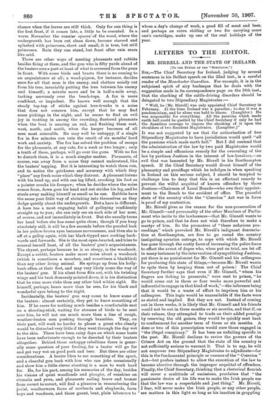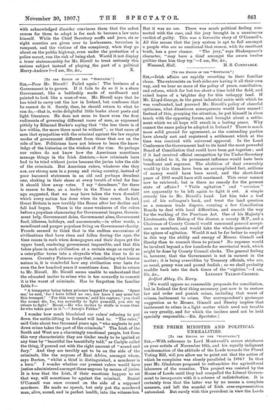LETTERS TO THE EDITOR.
MR. BIRRELL AND THE STATE OF IRELAND.
[To mos EDITOR OP THE SPECTATOR."_1 Sin,—The Chief Secretary for Ireland, judging by several sentences in his Belfast speech on the 22nd inst., is a careful reader of the Manchester Guardian. For example, it is in the
subjoined spirit of airy burlesque that he deals with the suggestion made in its correspondence page on the 18th inst., that the checking of the cattle-driving disorders should be delegated to two Stipendiary Magistrates:—
" Well, he [Mr. Birrell] was only appointed Chief Secretary in February. At the time Ireland was a paradise ; to-day it was a pandemonium, and he alone was held to blame. (Laughter.) He was responsible for everything. All the passions which made earth hell could be quelled by the Chief Secretary if only he had the dauntless courage to impose the checking of it upon the shoulders of two Resident Magistrates. (Laughter.)"
It was not suggested by me that the authorisation of two Stipendiary Magistrates to have jurisdiction would quell "all the passions which made earth hell." But I did contend that the administration of the law by two paid Magistrates would be a simple and efficacious remedy for the overruling of the law by partisan Justices in the interest of law-breakers,—an evil that was lamented by Mr. Birrell in his Southampton speech. If the Chief Secretary would divest himself of the pleasantry and persiflage which he indulges in when speaking in Ireland on this serious subject, I should be .tempted to challenge him to deny that this is an effectual remedy to prevent the wilful acquittal of known offenders by those Justices—Chairmen of Local Boards—who owe their appoint- ment to the Bench to the accident of office. The peaceful state of the country while the " Coercion " Act was in force is proof of my contention.
Mr. Birrell gives as the reason for the non-prosecution of Mr. Ginnell—and presumably of the other Members of Parlia-
ment who incite to the lawlessness—that Mr. Ginnell wants to go to prison, and that he does not wish therefore to make a martyr of him. So the promoters of "these nefarious pro- ceedings," which provoked Mr. Birrell's indignant denuncia- tion at Southampton, are free to go round the. country instigating agrarian outrage, to cope with which Mr. Birrell has gone through the costly farce of increasing the police force to effect the arrest of dupes who, when put on trial, are let off in many instances by the intervention of sympathising Justices, yet there is no punishment for Mr. Ginnell and his colleagues for producing this state of things,—because Mr. Birrell wants to spite them by keeping them out of prison ! The Chief Secretary further says that even if Mr. Ginnell, " whom his fingers are itching to prosecute," were sent to prison, "he would come out in three or four weeks more powerful and influential to engage in that kind of work,"—the inference being that it would be a waste of effort to imprison him or his colleagues. This logic would be unassailable if the facts were as stated and implied. But they are not. Instead of coming out in three weeks, it is likely that Mr. Ginnell and his friends would not be out in three months or six months, and that if, on their release, they attempted to trade on their added prestige by renewing the old games, they would be quickly sent back to confinement for another term of three or six months. A
dose or two of this prescription would cure those engaged in "the illegal conspiracy." It has been an unfailing specific in the past. Mr. Birrell declines to revive the powers of the Crimes Act on the ground that the state of the country is not sufficiently serious to warrant it. That is to say, he will not empower two Stipendiary Magistrates to adjudicate—for this is the fundamental principle. or essence of the " Coercion " Act—but piefers instead to allow the execution of the law to become abortive through the improper acquittal of offenders. Finally, the Chief Secretary, thinking that a .rhetoricul flourish will cover a multitude of omissions, proclaims that "the passionate desire of his life was to make the Irish people see
that the law was a respectable and just.thing." Birrell, I fear, will never make the Irish people, or any other people, see matters in this light so long as his inaction in grappling
with acknowledged disorder convinces them that the safest course for them to adopt is for each to become a law unto himself. While the Chief Secretary scoffs and jeers, six or eight counties are given over to lawlessness, terrorism is rampant, and the victims of the conspiracy, when they go about on the public highway, even under the protection of a police escort, run the risk of being shot. Would it not display a truer statesmanship for Mr. Birrell to treat seriously this serious subject instead of playing, the part of a political
Merry-Andrew F-1 am, Sir, &c., X.



















































 Previous page
Previous page